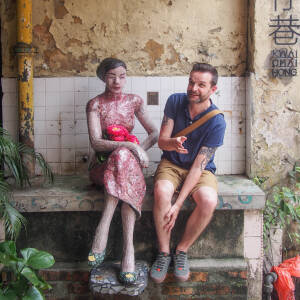Empty Nests
I finally went down to explore the rice fields I briefly mentioned here today (you can just make them out on the far right of the shot).
It was an incredibly pleasant surprise, and I now have a way to get out of my office most days, a place I'm usually stranded in.
Rather than the handful of rice fields then just another expressway I was expecting, the fields wound on for quite a while. There was also a river flowing through them which i was able to stroll along, and although the fields and trees were brown and bear (Korean grass dies down to a dull brown in winter) I suspect the place will be green and lush come the summer showers.
Flat and surrounded by mountains, the whole area was a wonderful sun trap, and I walked a while along the river as orange butterflies flitted about my head. Covers of coots gathered in the water beside me, as huge herons searched for a snack - before taking off startled and circling around overhead
There were also sporadic little 'villages' dotted from place to place. Some of the houses there were in beautiful condition, with Korean Jindo dogs dozing outside and rows of vegetables sprouting up in the gardens.
Others though, lay empty and abandoned, at one point an entire cluster of homes lay faded and derelict, fenced off like a giant museum exhibit.
Whilst a derelict building is in principle a sad thing, I find them interesting places and often eerily beautiful. Perhaps it's the way that they are all that remains of a sad story, or of a life changed tack, but I find pictures like these of the abandoned radioactive towns of Fukishima morbidly fascinating.
I chose today's shot though because it holds within it another fascinating cultural tidbit. The dark writing you can see to the left of the window reads 'gai : gangaji : samnida', followed by a phone number. This roughly translates as 'We buy puppies and dogs' and although it's possible they could be heading for the awful puppy mill trade, more likely they are wanted for their meat, sold as food in the unregulated dog meat industry.
More and more Koreans these days disagree with dog meat restuarants (I personally think they're something that will die out completely with the generations) and it's interesting that the advert was posted here, where there are not a lot of people, but those who are around may be struggling financially and may also keep a large Jindo dog, a commonly kept pet in rural areas).
As I wandered on, a small road appeared, weaving its way through more rice fields and other agriculture. There was also a sign for a hiking trail one kilometre away, with a picture of a bike on the sign - something I'll scout out on two wheels the next chance I get. A sign in another direction read 'Prehistoric Dwelling Site of Imam-dong and Wonsan-dong, stone-lined tomb, 1.1km' , a mythical-sounding place that just planted itself at the top of my 'things to blip' list.
Some interesting shots of derelict buildings by photographer Carey Primeau can be found here.
And a nice collection of abandoned building exteriors here.
Also, two years on from Japan's Fukushima disaster, is the man who refused to leave. Naoto Matsumura is a fifth-generation rice farmer who refused to evacuate his contaminated town, and as a result has been exposed to high levels of radiation. Even eating meat and plants raised in the area for a while after the disaster , doctors described him as 'Japan's most radioactive man'.
- 0
- 1
- Olympus E-M5
- 1/100
- f/5.6
- 14mm
- 200

Comments
Sign in or get an account to comment.


